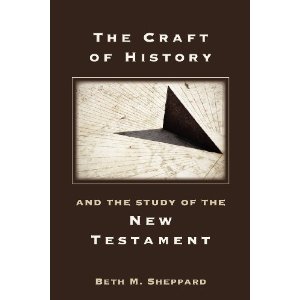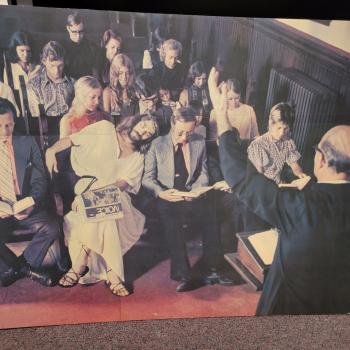Here is the second part of my dialogue with my friend and colleague Beth Sheppard.
4) One of the things I hear regularly from folks like Bart Ehrman is that a true modern critical historian must bracket out the whole notion of the miraculous, which of course leaves large chunks of the NT in the lurch since the miraculous is on almost every page of the Gospels and Acts, and is found elsewhere in the NT as well. Do you think it is necessary to ignore or dismiss the miraculous in order to be a good critical historian in the 21rst century? Or is that just a different form of methodological narrow-mindedness (a narrow mindedness that rules out some of the data ab initio)?
Thanks for this question, Ben. I think that when it comes to the “supernatural,” history can tell us some things, but theology and metaphysics also have a role to play. To be sure, historians may come in both flavors; those who believe in miracles and those who don’t. Granted, the question of whether miracles are possible doesn’t seem to be something historians could tackle easily. History is focused on what happened, why, and how it might be understood. Whether or not God is more powerful than the laws of natural physics and whether or not He does choose at times to act in contradiction to the laws may be a question for the discipline of theology instead of history. The bottom line? Just because someone believes that miracles do happen doesn’t make that individual an inferior historian, it is merely an indication that they likely have a different theology.
I’m not certain of the nuances of your conversation with Ehrman, but I’d think that to bracket off a miracle account (not just New Testament accounts, but those related to the Saints in the Middle Ages or those that people believe are occurring today) completely from the possibility of historical investigation may be to overlook aspects of the miracle narrative where history might provide insights related to the wider culture. Take the raising of Lazarus as an example. An historian might think of all sorts of questions to ask about the passage. Why did Lazarus die? Was there a plague or new virus that was making the rounds in that time period? Taking a different tact, one may ask “ How did John understand the passage of time?” After all, there are many time references in the pericope and different cultures understand the passage and implications of time differently. Are the time references in this passage similar to or different from norms found in the wider culture in which John was operating? And so on. There is no end to the questions that an historian might choose to investigate.
5) There is a lot of talk these days about our being in a post-modern, post-Christian era, even in America. And indeed the prefix post- seems to come up a lot in discussions of history and the Bible these days. We have post-colonial readings of the NT, post-Enlightenment readings of the NT and so on? What are the pluses and minuses of these new sorts of readings of the NT from an historical point of view? Do you think that we must really commit ourselves to saying that ‘texts’ do not have meanings, we give them their meanings as active readers”? This would seem to sound the death knell of traditional historiography because it suggests that even if texts do have ancient meanings, we are such strong readers that the original meaning is unknowable.
As I tried to indicate in Craft of History (164-169), postmodernism was bitter medicine for many historians to swallow – whether those historians studied WWI, or the history of the Ming Dynasty, or the New Testament. It is essentially a philosophy that some embrace, some reject, and some have found elements that are helpful and thus have found a middle way.
What are the extremes? A very harsh criticism of postmodernism for instance, may be found in Steven Cowan and James S. Spiegel’s “The Love of Wisdom: A Christian Introduction to Philosophy” pp 34-35. They contend that the postmodern assertion that there are no absolute truths is itself an absolute assertion. Thus the claim that all truth is relative is self-defeating. Further, they observe that if one makes the move that truth is subjective for oneself, then there is no reason for anyone else to adopt any particular view that is advanced either; this is solipsism in its purest form. It is on these two grounds, Cowan and Spiegel argue, that postmodernism fails. Purist postmodernists, for their part, might point out that Cowen and Spiegel are trapped in using Western logic and they are not offering a valid criticism because their use of logic proves that they are thinking in accordance with the culturally bound norms. In other words, by the very act of using logic Cowan and Spiegel prove the postmodernists’ point.
That does not mean that we are at a standstill. Historians outside of the field of Biblical Studies have, by and large, made their peace with postmodernism. Postmodernism wasn’t history’s death knell and historians have not abandoned the enterprise. Essentially they have taken the criticism offered by postmodernism seriously while at the same time still think that some elements of the past can be known with a reasonable degree of certainty. Remember my example of the puzzle from one of the previous questions in this blog interview? I mentioned that if an historian tried to put together an historical puzzle in ways analogous to forcing border pieces with straight edges together in the middle of the picture the resulting portrait probably wouldn’t really “work”. Nevertheless, historians will never have a complete picture of history because they will never have all the missing pieces. This is a radical shift in thinking from an era where it was believed that the past might be known with 100% certainty.
As a result, many historians might now speak not of “ the” answer but of a “plausible” answer, interpretation, or reconstruction.
So to answer your question, do I think that we are stuck saying “texts do not have meanings, we give them their meanings as active readers” (I’m not certain whom you are quoting here—I’m afraid that I’m not as well read as you are – ), I’d have to say that is certainly not where I’d go. I’d hang out with the moderates.
In the Craft of History (see pp 167-169) I summarize the work being done by Biblical Scholars Michael R. Licona and Pieter Craffert on these issues. They have slightly different perspectives from each other, but are both extraordinarily helpful. I would classify them as moderates. I’d also recommend that those who are reading this blog and who might be interested in more detail look at the volume edited by Donald Yerxa — Recent Themes in Historical Thinking: Historians in Conversation (University of South Carolina Press, 2008).
6) What new trends in historical study do you find promising for the study of the NT? What trends seem more like cul de sacs?
To be honest, I worry a bit about the current fashion for Marxist interpretations. It isn’t so much that they are cul de sacs, but more that the fascination with them may obscure the fact that other methods, such as cultural history (ethno-history) may be horses that have the potential for running longer. Not every subject or question lends itself easily to a Marxist interpretation. But there is very little that isn’t fodder for the cultural historian, for instance.
I also think that there are some methods, that when used in moderation, may really break open some new seams for investigation – particularly economic history and imaginative history. Now, since this is a blog with many readers, I feel obligated to state that imaginative history and counter-factuals generally require a very well read historian who knows the literature and subject well in order for the parallel history to work correctly. And we don’t need a deluge of them, likely just a few. A historian who uses this method isn’t just writing fiction, but instead feeds the insights gained from the parallel history back into the actual historical event in order to evaluate it. How about it Ben? Are you up for writing one?
Thank you, Ben for inviting me to participate in this blog. Happy Epiphany!
And the answer to Beth’s last question—- see A Week in the Life of Corinth!

















